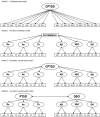Predicting PTSD and complex PTSD from interpersonal violence in Japanese school-based extracurricular sports activities: using the International Trauma Questionnaire (ITQ)
- PMID: 39712541
- PMCID: PMC11659647
- DOI: 10.3389/fpsyg.2024.1463641
Predicting PTSD and complex PTSD from interpersonal violence in Japanese school-based extracurricular sports activities: using the International Trauma Questionnaire (ITQ)
Abstract
Introduction: Victims of interpersonal violence in sports show various mental health concerns. However, no studies have quantitatively examined their primary complaints, considering psychological symptoms such as denial of self-concept and interpersonal challenges not captured by conventional post-traumatic stress disorder (PTSD). Recently, an association between interpersonal violence victimization and complex PTSD (CPTSD) has been noted in Japanese sports coaching situations, specifically for extracurricular sports activities. This study aimed to examine the applicability of the International Trauma Questionnaire (ITQ) and determine whether interpersonal violence victimization and related risk factors predicted PTSD and CPTSD in extracurricular sports activities in Japan.
Methods: This study included 651 adults aged 18-25 who had previously participated in extracurricular sports activities in junior high and high school. The ITQ was examined using confirmatory factor analysis with maximum likelihood with robust standard errors, fit indices comparisons, a graded response model, differential item functioning, and rank correlation designs. A binomial logistic regression model with robust standard errors examined the association of PTSD and CPTSD with interpersonal violence victimization and related risk factors.
Results: The optimal factor structure, measurement precision, and validity of the ITQ were confirmed. Physical and psychological violence victimization and the ITQ were positively correlated with PTSD, difficulties in emotion regulation, self-disgust, and interpersonal problems subscales, respectively. A high frequency of psychological and physical violence victimization experiences and self-identified LGB (lesbian, gay, or bisexual) were associated with PTSD and CPTSD diagnosability. Additionally, being a woman and in school life away from parents were associated solely with PTSD diagnosability.
Discussion: This is the first quantitative study to examine CPTSD in a study on interpersonal violence in sports. Our findings can provide insights into desirable victim support and enhanced clinical care in interpersonal violence in a sports context.
Keywords: ITQ; complex post-traumatic stress disorder; corporal punishment; extracurricular sports activities; interpersonal violence; mental health; post-traumatic stress disorder; safe sport.
Copyright © 2024 Toyoda, Ishikawa and Omi.
Conflict of interest statement
The authors declare that the research was conducted in the absence of any commercial or financial relationships that could be construed as a potential conflict of interest.
Figures
Similar articles
-
Assessing the factorial validity and the internal reliability of the International Trauma Questionnaire (ITQ); PTSD and complex PTSD among survivors of sexual violence in Ireland.Epidemiol Psychiatr Sci. 2022 Jun 17;31:e42. doi: 10.1017/S2045796022000245. Epidemiol Psychiatr Sci. 2022. PMID: 35712826 Free PMC article.
-
Trauma exposure and ICD-11 PTSD and CPTSD in a Greenlandic adolescent population.Eur J Psychotraumatol. 2024;15(1):2425242. doi: 10.1080/20008066.2024.2425242. Epub 2024 Nov 14. Eur J Psychotraumatol. 2024. PMID: 39540207 Free PMC article.
-
Measuring post-traumatic stress disorder and complex post-traumatic stress disorder using the International Trauma Questionnaire: results from a Hungarian clinical and non-clinical sample.Eur J Psychotraumatol. 2023;14(1):2152929. doi: 10.1080/20008066.2022.2152929. Eur J Psychotraumatol. 2023. PMID: 37052096 Free PMC article.
-
Understanding Trauma in IPV: Distinguishing Complex PTSD, PTSD, and BPD in Victims and Offenders.Brain Sci. 2024 Aug 25;14(9):856. doi: 10.3390/brainsci14090856. Brain Sci. 2024. PMID: 39335352 Free PMC article. Review.
-
Responding to concerns related to the measurement of ICD-11 complex posttraumatic stress disorder using the International Trauma Questionnaire.Child Abuse Negl. 2024 Jan;147:106563. doi: 10.1016/j.chiabu.2023.106563. Epub 2023 Nov 25. Child Abuse Negl. 2024. PMID: 38007852 Review.
References
-
- Ae M. (2014). Impact of corporal punishment on children in athletic club activities. J. Pedagog. Phys. Educ. 30, 63–67. 10.11243/jsppe.30.1_63 - DOI
-
- Asukai N., Kato H., Kawamura N., Kim Y., Yamamoto K., Kishimoto J., et al. . (2002). Reliability and validity of the Japanese-language version of the Impact of Event Scale-Revised (IES-R-J): four studies on different traumatic events. J. Nerv. Ment. 190, 175–182. 10.1097/00005053-200203000-00006 - DOI - PubMed
-
- Baker F. B. (2001). The Basics of Item Response Theory, 2nd Edn. College Park, MD: ERIC Clearinghouse on Assessment and Evaluation.
-
- Charak R., Cano-Gonzalez I., Ronzón-Tirado R., Ford J. D., Byllesby B. M., Shevlin M., et al. . (2023). Factor structure of the international trauma questionnaire in trauma exposed LGBTQ+ adults: role of cumulative traumatic events and minority stress heterosexist experiences. Psychol. Trauma 15, 628–636. 10.1037/tra0001440 - DOI - PubMed
LinkOut - more resources
Full Text Sources


